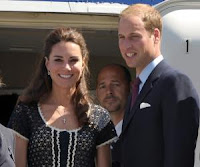Those of you who know me are well aware of what an Anglophile I am. Who else would give up a cushy L.A. Times job to move 6,000 miles away to spend five years working as a journalist in London? And my framed invitation (plus menu card) to have dinner with Queen Elizabeth and Prince Philip on the Royal Yacht Britannia is among my most-treasured life souvenirs.
So, naturally, I felt it was worth special notice to share the news that leaders of Commonwealth countries decided at their summit meeting on Friday (in Perth, Australia) to change Royal Succession Laws. This represents a major paradigm shift for gender issues. The Commonwealth decision means that first-born daughters of future British monarchs now have an equal right to the throne. Previously, a younger male heir would inherit the crown rather than his older female sibling. What this means is that if the Duke and Duchess of Cambridge (pictured above) have a daughter as their first-born child, she would be the next monarch before any younger brothers. This new ruling would also allow any future rulers to marry a Roman Catholic.
British Prime Minister David Cameron said that "Attitudes have changed fundamentally over the centuries. The idea that the younger son should become monarch instead of an elder daughter, simply because he is a man, or that a future monarch can marry someone of any faith except a Catholic, this way of thinking is at odds with the modern countries that we have become."
The discussion about changes in Royal Succession Laws was prompted by Prince William's marriage to Catherine Middleton earlier this year. Queen Elizabeth's opening statement at the summit did not directly address the Succession Laws, but she did say that women should play a greater role in society. There are 54 Commonwealth States, and twelve of the 20 countries have the highest rates of "child brides" are in the Commonwealth.
Looking forward to your comments...









